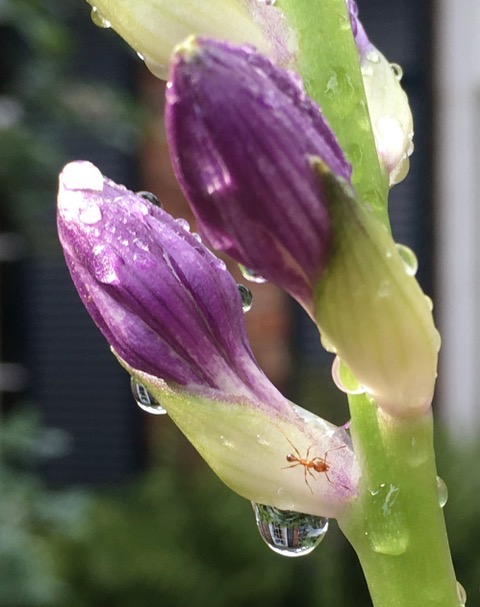“The secret of seeing is a pearl of great price . . . although the pearl can be found, it cannot be sought.
~Annie Dillard, Pilgrim at Tinker Creek
 When I retired from fulltime teaching, the thing I craved most was not to be in a hurry all the time. Chief among the things I wanted to do as I stepped into the third third of my life, was to slow down. I hoped to spend my time reading, writing, gardening, walking, and appreciating the goodness of life in a way I rarely had time to do in my busy career.
When I retired from fulltime teaching, the thing I craved most was not to be in a hurry all the time. Chief among the things I wanted to do as I stepped into the third third of my life, was to slow down. I hoped to spend my time reading, writing, gardening, walking, and appreciating the goodness of life in a way I rarely had time to do in my busy career.
I started by re-reading a book I had loved years earlier, Pilgrim at Tinker Creek. Little did I know the extent to which Annie Dillard’s Chapter 2 on “Seeing” would influence my retirement. It inspired me to begin the intentional practice of sitting outside for an hour a day in the act of paying attention to the world around me.
The current trend of “mindfulness” seemed more complex than the unsophisticated focus I was seeking. I thought of it as simple attention. I was a first grade teacher, after all. I knew the importance of paying attention. I had spent 29 years of my life encouraging children to do just that.
One first grade lesson I taught often, though looking back, not often enough, was to give my students a 36-inch length of string and have them lay it in a circle on the grass, with instructions to sit still and watch the space inside the ring while I timed them for one silent minute. At the end of the minute, without talking, we returned to the classroom to write or draw what we had seen. The children’s reflections always wowed me.
For those same 29 years, I had spent 30 minutes a day on a playground bench, watching children run and climb and discover new wonders of their world. I depended on that daily respite, recognizing it as essential for student and teacher alike. Most people called it recess. I remember it as a kind of daily sabbath.
The calm that returned to the classroom after recess was palpable––and nourishing for all of us. It was the gift of serenity that comes after a time of mental freedom, after being out from under any form of direct instruction.
 Against this backdrop of my teaching life, I re-read Annie Dillard’s words about seeing. It was a short leap to stretch my half-hour outdoor routine of watching children on the playground to a full hour in the quiet of my own backyard—reading, or writing, or contemplating, or simply paying attention to the space, the time, the activity, and the sound of the place—and at the end of the hour to journal about the single-most significant thing observed. I call it “longsitting,” and it has become a daily ritual that offers sacred gifts, the proportions of which I could not have anticipated.
Against this backdrop of my teaching life, I re-read Annie Dillard’s words about seeing. It was a short leap to stretch my half-hour outdoor routine of watching children on the playground to a full hour in the quiet of my own backyard—reading, or writing, or contemplating, or simply paying attention to the space, the time, the activity, and the sound of the place—and at the end of the hour to journal about the single-most significant thing observed. I call it “longsitting,” and it has become a daily ritual that offers sacred gifts, the proportions of which I could not have anticipated.
Both the beauty and the brutality of nature make themselves vividly explicit when one takes time to notice. Each hour of longsitting triggers fresh enlightenments or questions about the regenerating genius of the natural world, often leaving me breathless in wonder. The sudden appearance of mushrooms after a rainy day, for instance, always provokes an unanswerable wonderment. If the only job of the millions of species of fungi is to consume decay on the earth, why their remarkable beauty?
The practice of longsitting has taught me to expect the unexpected by its regularity, yet I continue to be surprised by it. Ordinary observations become extraordinary under scrutiny. The blind perseverance of a chewing caterpillar that can destroy a leaf in seconds. The pre-dawn murmurs of waking birds that swell to a hallelujah chorus as the sun rises. The tattered wing of a butterfly, and the history it suggests. The terrible anguish of a live mourning dove being torn apart by a broad-winged hawk in the driveway. A season-long nestwatch of bluebirds, from the first quiver-and-fluff mating routine, the bringing of sticks, the sitting on eggs, through the noble care of their young, the clamor of nestlings, and the breathtaking moment of fledge, prompting my fervent wishes for their safety. And oh, the fall of a leaf, taking the one ride of its life, inspiring thoughts large and small about life and death and decay and new growth.
Gifts of sabbath come on the wings of such encounters as these but for the simple act of paying attention to the world for an hour a day.
~dkm
 Deborah Miller is a veteran educator living in Decatur, Georgia. She taught kindergarten through fourth grades in public schools for 30 years, as well as private Suzuki flute lessons, ending her career as a supervisor of student teachers at the university level.
Deborah Miller is a veteran educator living in Decatur, Georgia. She taught kindergarten through fourth grades in public schools for 30 years, as well as private Suzuki flute lessons, ending her career as a supervisor of student teachers at the university level.
She retired early to try her hand at writing fiction for young readers, and recently, haiku, having read up on the masters, Basho and Issa, surprising even herself.
Debby enjoys daily yoga, meditation, walking, flute practice, backyard birding, nature blogging, reading, and taking every Master Class that interests her. She is currently a member of two writing groups, three book clubs, the National Audubon Society, Georgia Nature Conservancy, and the Society of Children’s Book Writers and Illustrators.
Visit her blog at backyardspectator.blogspot.com
